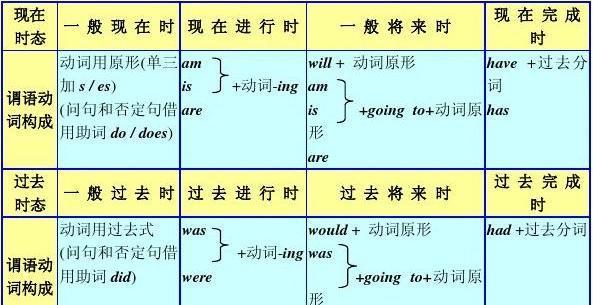Be动词的十六种时态包括现在时、过去时、将来时和过去将来时的简单时、进行时、完成时和完成进行时。每种时态都有其特定的形式和用法,用于表示不同的状态、性质或存在。

现在时态
- 现在简单时:am/is/are
现在简单时表示当前的状态或情况。例如:I am a student.(我是学生。)She is happy.(她很开心。)They are playing football.(他们正在踢足球。)
- 现在进行时:am/is/are + 现在分词
现在进行时表示正在进行的动作或状态。例如:I am studying English.(我正在学英语。)She is watching TV.(她正在看电视。)They are playing basketball.(他们正在打篮球。)
- 现在完成时:have/has been + 现在分词
现在完成时表示过去某个时间开始的动作一直持续到现在或刚刚结束的动作。例如:I have been studying English for three years.(我已经学习英语三年了。)She has been working here since 2010.(她从2010年开始在这里工作。)They have been playing basketball since this morning.(他们从今天早上开始一直在打篮球。)
- 现在完成进行时:have/has been + 现在分词
现在完成进行时表示过去某个时间开始的动作一直持续到现在,且仍在进行。例如:I have been studying English for three hours.(我已经学习英语三个小时了。)She has been working on this project for two weeks.(她已经在这个项目上工作了两周。)They have been playing basketball for three hours.(他们已经打了三个小时的篮球。)
过去时态
- 过去简单时:was/were
过去简单时表示过去某个时间的状态或情况。例如:I was a student.(我曾经是学生。)She was happy yesterday.(昨天她很开心。)They were playing basketball last night.(昨晚他们在打篮球。)
- 过去进行时:was/were + 现在分词
过去进行时表示过去某个时间正在进行的动作或状态。例如:I was studying English at 8 o'clock last night.(昨晚8点我正在学英语。)She was watching TV when I called her.(我给她打电话时她正在看电视。)They were playing basketball when it started raining.(下雨时他们正在打篮球。)
- 过去完成时:had been + 现在分词
过去完成时表示过去某个时间开始的动作一直持续到另一个过去的时间或动作。例如:I had been studying English for two hours when my friend called me.(我朋友打电话给我时我已经学习英语两个小时了。)She had been working here for five years before she got promoted.(她晋升前已经在这里工作了五年。)They had been playing basketball for an hour before they got tired.(他们玩了一个小时篮球之后觉得累了。)
- 过去完成进行时:had been + 现在分词
过去完成进行时表示过去某个时间开始的动作一直持续到另一个过去的时间或动作,且在此期间一直在进行。例如:I had been studying English for two hours when my friend called me.(我朋友打电话给我时我已经学习英语两个小时了。)She had been working here for five years before she got promoted.(她晋升前已经在这里工作了五年。)They had been playing basketball for an hour before they got tired.(他们玩了一个小时篮球之后觉得累了。)
将来时态
- 将来简单时:will be
将来简单时表示将来某个时间的状态或情况。例如:I will be a student next year.(明年我将会是学生。)She will be happy if she gets the job.(如果她得到这份工作她会很开心。)They will be playing basketball tomorrow.(明天他们将会打篮球。)
- 将来进行时:will be + 现在分词
将来进行时表示将来某个时间正在进行的动作或状态。例如:I will be studying English at 8 o'clock tomorrow morning.(明天早上8点我将会学英语。)She will be watching TV when I arrive.(我到达时她将会在看电视。)They will be playing basketball when you get there.(你到那里时他们将会在打篮球。)
- 将来完成时:will have been + 现在分词
将来完成时表示将来某个时间之前已经完成的动作。例如:I will have been studying English for four years by the time I graduate.(我毕业时已经学习英语四年了。)She will have been working here for ten years next month.(下个月她在这里已经工作了十年。)They will have been playing basketball for three hours by the time you arrive.(你到达时他们已经打了三个小时的篮球了。)
- 将来完成进行时:will have been + 现在分词
将来完成进行时表示将来某个时间之前一直在进行的动作。例如:I will have been studying English for four hours by the time you come back.(你回来时我将已经学习英语四个小时了。)She will have been working on this project for two weeks by the end of this month.(这个月底她已经在这个项目上工作了两周。)They will have been playing basketball for five hours by the time the game ends.(比赛结束时他们将会打了五个小时的篮球。)
过去将来时态
- 过去将来简单时:would be
过去将来简单时表示过去某个时间将要发生的状态或情况。例如:I thought I would be a student by now.(我原以为现在我应该是学生了。)She hoped she would be happy with her decision.(她希望她的决定能让她快乐。)They knew they would be playing basketball later that day.(他们知道他们将会在那天晚些时候打篮球。)
- 过去将来进行时:would be + 现在分词
过去将来进行时表示过去某个时间将要进行的动作或状态。例如:I thought I would be studying English at this time yesterday.(昨天这个时候我原以为我应该在学英语。)She hoped she would be watching TV when her friends came over.(她希望她的朋友来时她正在看电视。)They knew they would be playing basketball when it started raining.(下雨时他们知道他们将会在打篮球。)
- 过去将来完成时:would have been + 现在分词
过去将来完成时表示过去某个时间之前本应完成的动作,但实际上没有完成。例如:I thought I would have been studying English for five years by now, but I haven't.(我原以为我现在已经学习英语五年了,但实际上没有。)She hoped she would have been working on this project for two weeks, but she wasn't.(她希望她现在已经在这个项目上工作了两周,但实际上没有。)They knew they would have been playing basketball for five hours by the time they finished, but they didn't.(他们知道他们应该在打了五个小时的篮球后结束,但实际上没有。)
- 过去将来完成进行时:would have been + 现在分词
过去将来完成进行时表示过去某个时间之前一直在进行的动作,但实际上没有完成。例如:I thought I would have been studying English for five hours by the time you came back, but I wasn't.(你回来时我原以为我已经学习英语五个小时了,但实际上没有。)She hoped she would have been working on this project for two weeks by the end of last month, but she wasn't.(上个月底她希望她已经在这个项目上工作了两周,但实际上没有。)They knew they would have been playing basketball for five hours by the time the game ended, but they didn't.(比赛结束时他们知道他们应该已经打了五个小时的篮球,但实际上没有。)
